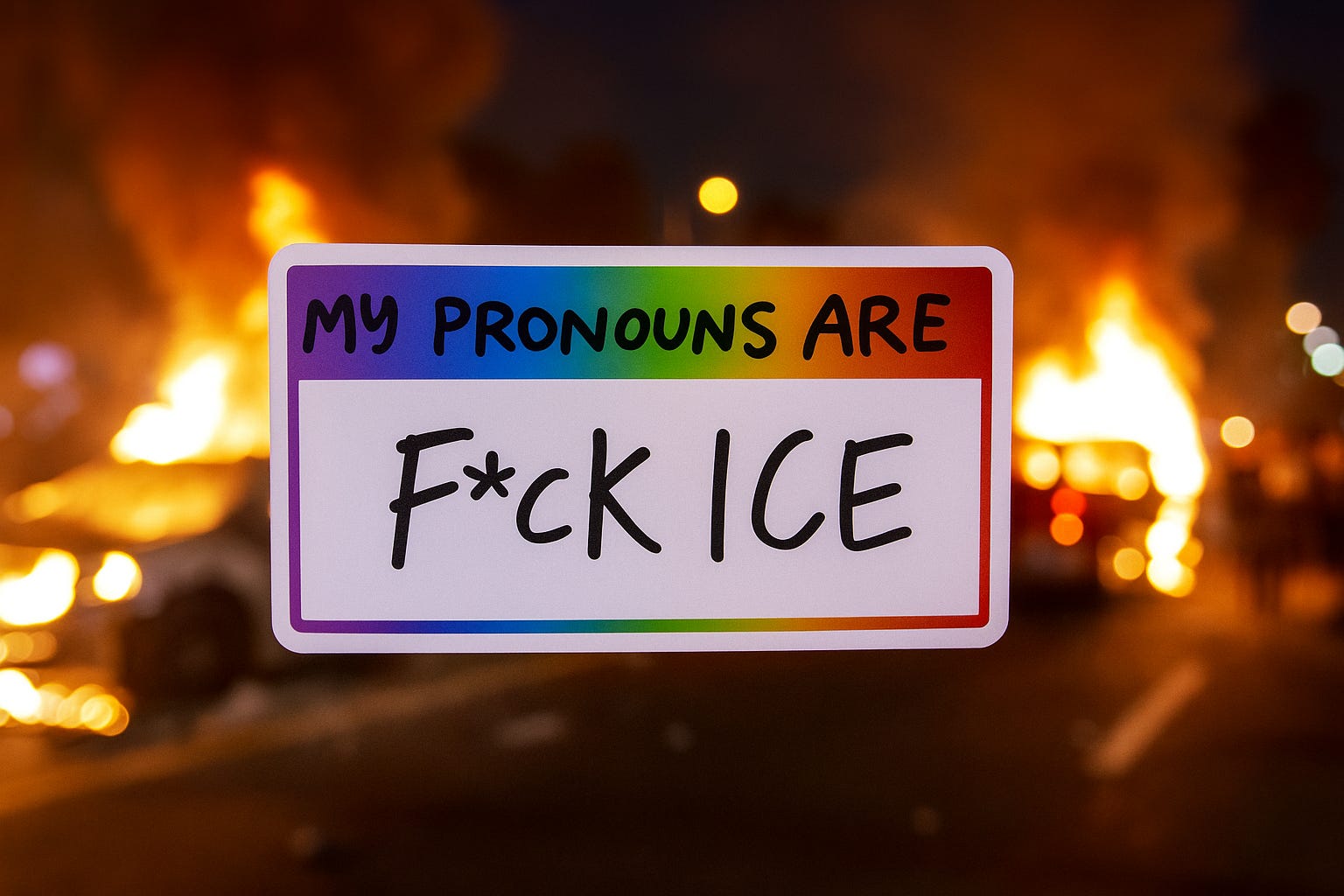The Revolution Will Be Peer Reviewed
A peer-reviewed paper titled ‘My pronouns are fuck ICE’ turns tea, pronouns, and gender confusion into anti-colonial resistance.
Reality’s Last Stand is a reader-supported publication. Please consider becoming a paying subscriber or making a one-time or recurring donation to show your support.
About the Author
Dr. Colin Wright is an evolutionary biology PhD, Manhattan Institute Fellow, and CEO/Editor-in-Chief of Reality’s Last Stand. His writing has appeared in The Wall Street Journal, The Times, the New York Post, Newsweek, City Journal, Quillette, Queer Majority, and other major news outlets and peer-reviewed journals.
If you’re wondering how radical activist ideologies have infiltrated academia, look no further than the peer-reviewed journals publishing what can only be described as progressive performance art dressed up as scholarship. In recent years, I’ve come across papers about feminist relationships with brine shrimp, the queering of babies, self-described “ecosexuals” who claim, in earnest, that “the Earth is a big badass butch dyke in menopause,” and many others.
This is not satire. Although, frankly, it’s indistinguishable from it.
The latest entry into this hall of academic absurdity is a paper titled: “My pronouns are fuck ICE: on the colonial gender continuum, colonial dysphoria, and loving illegality.” The timing of me discovering it is grimly appropriate, considering the recent wave of ICE-related protests and riots across the country. The paper was published in the International Journal of Qualitative Studies in Education—a Taylor & Francis journal, mind you, not some niche blog.
The author, Omi Salas-SantaCruz (they/them), is an Assistant Professor in the Department of Education, Culture & Society at the University of Utah. Her (I’m using she/her pronouns because I believe Omi to be female) work sits at the intersection of decolonial theory, transgender studies, and critical race studies—in other words, it checks all the right activist boxes. But the real issue here is not just that papers like this are being written. It’s that they’re being peer-reviewed, published, and celebrated as serious contributions to academic discourse.
The Mission to Transform Academia—Literally
The paper purports to explore the role of the Multicultural Community Center (MCC) at UC Berkeley as a refuge and revolutionary space for trans-Latinx and Indigenous students. But from the outset, it’s clear this is not a neutral investigation. It begins with the premise that “the university is an oppressive institution in its organizational structure and its essential functions.”
That’s a bold claim from someone who now holds a faculty position. But rather than interrogating or examining this premise, the paper treats it as settled fact that guides the rest of the analysis. The university is not just flawed or insufficiently inclusive; it is, in the author’s framing, inherently and fundamentally oppressive. It exists to reproduce “cis-heteronormativity,” “whiteness,” and settler colonial power structures, and every part of its organization—from academic departments to administrative offices—is implicated.
Even more baffling, the MCC’s mission, as described in the paper, is to “transform the university from a source of oppression into a force for social transformation.” In other words, the center operates with a goal of undermining and reshaping the very institution that created it and funds it. Imagine a university hiring a professor whose research agenda explicitly calls for dismantling the university itself—and then rewarding that agenda with publication, promotion, and tenure.
The MCC is said to operate “in, but not of the university,” which positions it as a kind of insurgent outpost within enemy territory. It is described as student-led, grounded in the values of “anti-oppression, sustainability + wellness, popular education, and cross-cultural solidarity.” These are not educational goals in any traditional sense. They are activist principles wielded explicitly in opposition to the structures of knowledge production that have historically defined the university.
The paper also opens with a land acknowledgment, noting the MCC is on “xučyun, the ancestral and unceded territory of the Chochenyo-speaking Ohlone people.” This is followed by lamentations about the “erasure of Indigenous knowledge” and calls for “non-imperialist knowledge production”—a euphemism for rejecting scientific objectivity, empirical inquiry, and methodological rigor in favor of narratives grounded in subjective identity and personal experience.
This isn’t just a critique of specific university policies. It is a wholesale rejection of the university as a legitimate institution. And yet, paradoxically, the author relies on the credibility of that very institution to publish, promote, and legitimize this paper.
🎧 Prefer to listen?
Watch or listen to a full breakdown of this paper by evolutionary biologist Dr. Colin Wright and journalist Brad Polumbo on the latest episode of the Citation Needed podcast.
Brewing Tea and Revolutionary Gossip
From this ideological foundation, the paper introduces its central concept: the “Colonial Gender Continuum” (CGC), a framework claiming that all gender norms and equity efforts are tainted by colonialism. To illuminate how the CGC works in practice, the author describes “vibrant discussions” that occur in the MCC’s kitchen, where students wait for food to heat up or water to boil for what the paper calls “de-stress tea.”
These moments, the paper says, create opportunities for “organizational gossip,” defined as informal talk that evolves into revolutionary dialogues called “queer pláticas”—Spanish for “discussions.” These pláticas, we’re told, are “essential for reflection, knowledge creation, and community formation.”
One such discussion, treated as empirical data, takes place between three students identified as:
Glo, “a trans nonbinary Afro-Caribeñx and Mexican sophomore”
Toni, “an Indigenous Nahua Cipotx with Salvadoran and Nicaraguan Miskito roots”
Mars, “a non-binary Zapotec prietx-alien-femme”
Yes, you read that correctly. One of the student’s self-concept includes not only a gender identity but also their status as an undocumented “alien.”







